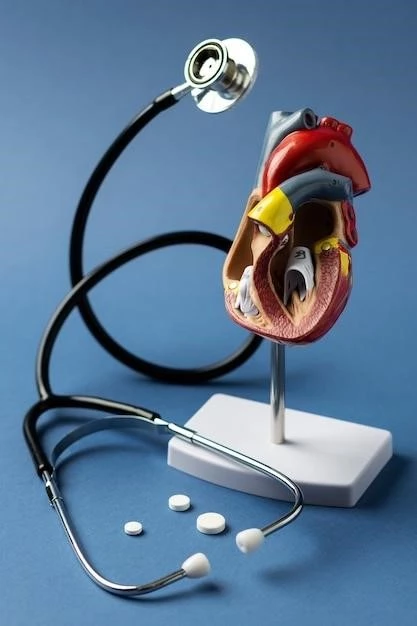Understanding Heart Block
Disease⁚ Heart block, also known as atrioventricular block, affects the cardiac conduction system, disrupting the normal heart rhythm. EKG monitoring plays a vital role in detecting this condition, guiding treatment decisions like pacemaker implantation. A cardiologist’s expertise is crucial for managing heart block and preventing complications.
Overview of Heart Rhythm and the Cardiac Conduction System
The heart’s rhythm is regulated by the cardiac conduction system, a network of specialized cells that generate and propagate electrical impulses. These impulses coordinate the heart’s contractions, ensuring efficient blood circulation. In cases of heart block, there is a disruption in the transmission of these electrical signals between the atria and ventricles, leading to irregular heartbeats or pauses in the heartbeat pattern. This condition can range from mild to severe, impacting overall cardiovascular health. Understanding the intricate workings of the cardiac conduction system is crucial in diagnosing and managing heart block effectively.
Understanding Atrioventricular Block (Heart Block)
Atrioventricular block, commonly referred to as heart block, is a condition characterized by impaired conduction between the atria and ventricles of the heart. This disruption in the electrical signals can lead to a slower heart rate or pauses in the heart rhythm. There are three degrees of heart block, ranging from mild to severe based on the extent of conduction disturbance. Symptoms of heart block may include dizziness, fatigue, chest pain, and fainting spells. It is essential to monitor and diagnose heart block promptly to prevent complications such as arrhythmias, heart failure, or cardiac arrest. Timely intervention and treatment by a cardiologist can help manage heart block effectively, with options like pacemaker implantation to regulate the heart’s electrical activity and restore normal rhythm.
Importance of EKG Monitoring in Detecting Heart Block
Electrocardiogram (EKG) monitoring plays a crucial role in detecting heart block by recording the electrical activity of the heart. This non-invasive test helps healthcare providers assess the heart’s rhythm and identify any abnormalities in the conduction system. Through EKG analysis, different degrees of heart block can be diagnosed, enabling timely intervention and treatment. Continuous EKG monitoring is especially valuable in patients with known heart conditions or risk factors for heart block. Detecting heart block early through EKGs allows for appropriate medical management, such as medication adjustments or the consideration of pacemaker placement to regulate the heart’s electrical impulses. Regular EKG monitoring is a cornerstone in managing heart block and ensuring optimal cardiovascular health.
Medical Treatment for Heart Block

Medical treatment for heart block aims to manage the condition and prevent complications related to abnormal heart rhythms. In cases where symptoms are mild, close monitoring by a cardiologist may suffice. However, more severe forms of heart block often require intervention, such as the implantation of a pacemaker. A pacemaker is a small device that’s placed under the skin and sends electrical impulses to regulate the heart rate. This ensures that the heart maintains a steady rhythm and can effectively pump blood throughout the body. Medications may also be prescribed to help stabilize the heart’s electrical activity and prevent further episodes of heart block. It is essential for individuals with heart block to follow their cardiologist’s recommendations closely and attend regular follow-up appointments to monitor their condition and adjust treatment as needed.
Impact of Electrical Impulses on Cardiovascular Health
The heart’s electrical impulses play a fundamental role in maintaining cardiovascular health. These signals coordinate the heart’s contractions, ensuring an efficient pumping of blood throughout the body. In conditions like heart block, where the conduction of electrical impulses is disrupted, the heart’s rhythm can become irregular, leading to potential complications such as arrhythmias or heart failure. Disruptions in the heart’s electrical system can significantly impact overall cardiovascular function, potentially compromising blood flow to vital organs. Understanding the importance of these electrical signals can help individuals appreciate the significance of maintaining a healthy heart rhythm for optimal cardiovascular health. Regular monitoring and appropriate medical interventions, guided by a cardiologist, are essential in preserving the heart’s electrical balance and preventing complications associated with abnormal heart rhythms.
The Role of a Cardiologist in Managing Heart Block
A cardiologist plays a vital role in managing heart block, overseeing the diagnosis, treatment, and long-term care of patients with this condition. Specializing in heart health, cardiologists are trained to interpret diagnostic tests like EKGs to identify heart block and its severity. Based on the findings, a cardiologist will recommend an appropriate treatment plan, which could include medications, lifestyle modifications, or pacemaker implantation. Cardiologists work closely with patients to monitor their heart health, adjust treatment as needed, and address any concerns or symptoms that may arise. Their expertise in cardiovascular medicine ensures that individuals with heart block receive comprehensive care aimed at optimizing heart function and overall well-being.
Understanding Heart Rate and Its Relation to Heart Block
Heart rate, measured in beats per minute, is closely linked to heart block. In this condition, the heart’s electrical system is disrupted, leading to abnormal heart rates. Depending on the severity of the heart block, the heart rate may slow down, leading to symptoms like dizziness, fatigue, or fainting. Understanding the relationship between heart rate and heart block is crucial in diagnosing and managing the condition effectively. Monitoring changes in heart rate through tools like EKGs helps healthcare providers evaluate the heart’s conduction system and determine the appropriate course of treatment. By addressing the underlying causes of abnormal heart rates associated with heart block, cardiologists can implement interventions to regulate the heart’s rhythm and improve overall cardiovascular health.
Preventive Measures and Lifestyle Changes for Heart Block
Preventive measures and lifestyle changes play a significant role in managing heart block and promoting cardiovascular health. Individuals diagnosed with heart block are advised to maintain a heart-healthy lifestyle, which includes following a balanced diet, engaging in regular physical activity, and avoiding tobacco and excessive alcohol consumption. Managing underlying conditions like hypertension and diabetes is crucial to reduce the risk of complications associated with heart block. Regular follow-ups with a cardiologist for monitoring and adjustments to treatment are essential. By adopting a heart-healthy lifestyle and adhering to medical recommendations, individuals can help manage heart block effectively and improve their overall quality of life.
